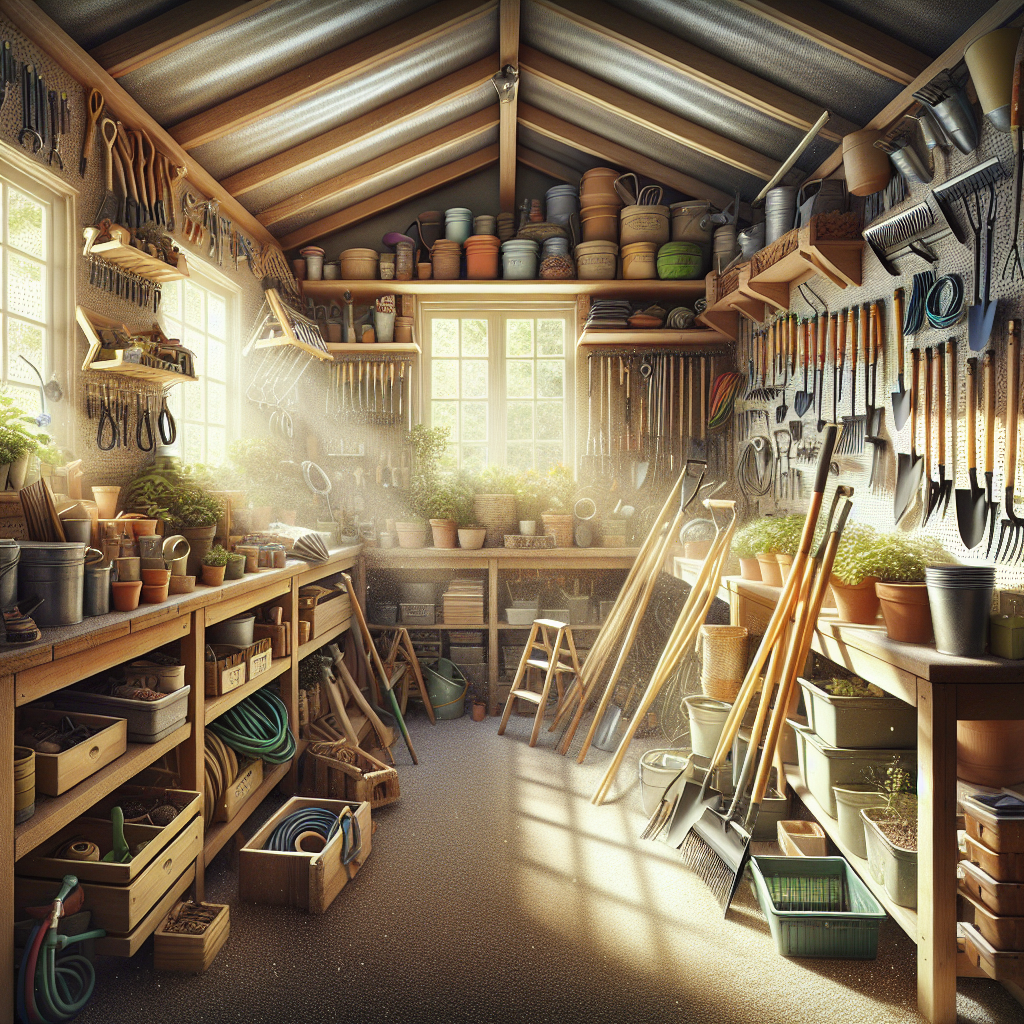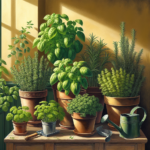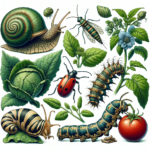Understanding the Problem
How to Sharpen Garden Tools
- Sharp tools are essential: Keeping your garden tools sharp not only makes your work easier but also promotes healthier plants and reduces the risk of injury.
- Use the right tool: Different tools require different sharpening techniques. Ensure you are using the appropriate method for each tool.
- Sharpening techniques: Whether using a file, sharpening stone, or specialized tool sharpener, maintain a consistent angle and firm pressure for best results.
- Regular maintenance: Make sharpening a regular part of your gardening routine to ensure your tools are always in top condition.
How to Maintain Garden Equipment
- Clean after each use: Remove dirt and debris from your equipment to prevent corrosion and extend its lifespan.
- Inspect for damage: Regularly check for any signs of wear or damage such as rust, loose parts, or broken handles. Repair or replace as needed.
- Proper storage: Store your garden equipment in a dry, protected area to prevent exposure to the elements and potential damage.
- Lubricate moving parts: Keep hinges, blades, and other moving parts well lubricated to ensure smooth operation and prevent premature wear.
Identifying Common Garden Invaders
When it comes to maintaining a flourishing garden, one of the key challenges faced by gardeners is dealing with unwelcome visitors that can wreak havoc on your carefully tended plants. Identifying these common garden invaders is the first step towards effectively managing and keeping them out of your garden.
How to Sharpen Garden Tools
Sharp garden tools are essential for efficient gardening tasks. Blunt tools not only make your work harder but can also damage your plants. Follow these steps to keep your garden tools sharp:
- Clean the Tools: Before sharpening, make sure to clean the tools to remove any dirt or debris.
- Use a File or Sharpener: Invest in a good quality file or sharpener designed for the specific tool you are sharpening.
- Sharpen Carefully: Work on the beveled side of the blade and maintain the original angle to ensure a proper edge.
- Test the Sharpness: After sharpening, test the tool on a piece of paper or a small branch to check the sharpness.
How to Maintain Garden Equipment
Proper maintenance of garden equipment not only extends their lifespan but also ensures they function effectively when you need them. Here are some tips for maintaining your garden equipment:
- Clean Regularly: Dirt and moisture can damage equipment, so make it a habit to clean them after each use.
- Check for Wear and Tear: Inspect your equipment for any signs of damage or wear, such as loose parts or rust.
- Oil Moving Parts: Lubricate moving parts with oil to prevent friction and ensure smooth operation.
- Store Properly: Keep your equipment in a dry place, away from direct sunlight, to prevent rust and damage.
Why it’s Important to Keep Animals Out
Protect Your Garden Investments
Having animals in your garden can lead to destruction of plants, flowers, and vegetables that you have spent time and effort cultivating. Protect your investments by keeping unwanted visitors at bay.
Maintain Garden Aesthetics
Animals such as rabbits, deer, or rodents can cause damage to the visual appeal of your garden. Preserve its beauty and charm by preventing these creatures from wreaking havoc.
Physical Barriers
How to Sharpen Garden Tools
Keeping your garden tools sharp is essential for efficient gardening. Here are some tips on how to maintain sharpness:
- Clean the Tools: Before sharpening, make sure to clean off any dirt or debris from the tools.
- Use the Right Tools: Invest in a quality file or sharpening stone suitable for the specific tool you are sharpening.
- Sharpen Regularly: It’s easier to maintain sharpness than to let tools get too dull.
- Angle Matters: Follow the original bevel angle when sharpening to maintain the tool’s effectiveness.
- Test the Sharpness: Always test the sharpness of the tool before using it in the garden.
How to Maintain Garden Equipment
Proper maintenance of garden equipment prolongs its lifespan and ensures optimal performance. Here are some maintenance tips:
- Regular Cleaning: After each use, clean off dirt and residue to prevent corrosion.
- Check for Damage: Inspect equipment for any signs of wear and tear regularly.
- Lubrication: Apply lubricant to moving parts to prevent rust and ensure smooth operation.
- Storage: Store equipment in a dry and secure place to prevent damage from weather conditions.
Installing Fences and Walls
How to Sharpen Garden Tools
Properly sharpened garden tools are essential for maintaining a well-kept garden. Follow these steps to ensure your tools are in top condition:
- Choose the Right Tools: Use a file or sharpening stone appropriate for the tool you are sharpening.
- Clean the Tools: Remove any dirt or debris from the tools before sharpening to prevent damage to the blades.
- Find the Correct Angle: Each tool has a specific sharpening angle, ensure you sharpen at the correct angle for best results.
- Use Smooth Strokes: Apply consistent pressure and use smooth strokes along the blade for even sharpening.
- Test the Sharpness: Test the sharpness of the tool by making a few cuts to ensure it cuts cleanly through materials.
How to Maintain Garden Equipment
Maintaining your garden equipment is key to their longevity and effectiveness. Here are some tips on how to keep your gear in great shape:
- Regular Cleaning: After each use, clean your garden equipment to remove any dirt or residue that can cause damage.
- Proper Storage: Store your tools and equipment in a dry, covered area to prevent rust and deterioration.
- Oil Moving Parts: Applying oil to moving parts of your equipment will help prevent rust and keep them running smoothly.
- Inspect for Damage: Regularly inspect your tools for any signs of damage or wear and tear, and address any issues promptly.
Using Netting and Mesh to Protect Plants
Benefits of Using Netting and Mesh
Netting and mesh can be highly effective in keeping animals out of your garden while allowing proper ventilation and sunlight to reach your plants.
Choosing the Right Netting or Mesh
When selecting netting or mesh for your garden, opt for durable materials that are strong enough to withstand outdoor conditions and resistant to tearing. Ensure the size of the netting or mesh is appropriate to block entry for the animals you are trying to deter.
Installing Netting and Mesh
To effectively protect your plants, secure the netting or mesh around the perimeter of your garden beds using stakes or a suitable support structure. Make sure the netting or mesh is tightly fastened to prevent any gaps that animals could exploit.
Maintaining Netting and Mesh
Regularly inspect the netting or mesh for any damage or wear and promptly repair or replace it as needed. Clean the netting or mesh occasionally to prevent debris from accumulating and compromising its effectiveness.
Additional Tips
- Use netting or mesh in combination with other deterrents for enhanced protection against animals.
- Consider the aesthetic appeal of the netting or mesh to complement your garden while serving its purpose.
Creating Raised Beds to Deter Animals
When it comes to protecting your garden from unwanted animal visitors, creating raised beds can be a highly effective deterrent. Raised beds not only offer a range of benefits for your plants but also make it more challenging for animals to access and damage your precious garden.
Advantages of Raised Beds:
- Improved drainage: Raised beds provide better drainage for your plants, preventing waterlogging and root rot.
- Warmer soil: The soil in raised beds warms up faster in spring, extending the growing season.
- Better soil quality: You can control the soil quality more easily in raised beds, ensuring optimal growing conditions for your plants.
Building Your Raised Bed:
Constructing a raised bed involves building a contained area for planting that is elevated above the ground.
- Choose a location: Select a spot in your garden that receives adequate sunlight and is easily accessible for watering and maintenance.
- Materials: Gather materials such as wood, bricks, or blocks to construct the frame of your raised bed. Ensure the material is non-toxic and will not leach harmful chemicals into the soil.
- Assembly: Secure the materials to form a rectangular or square bed, ensuring it is sturdy enough to hold the soil and plants.
- Fill with soil: Add a nutrient-rich soil mixture to the raised bed, ready for planting.
Planting in Raised Beds:
Once your raised bed is constructed, it’s time to plant your garden with a variety of fruits, vegetables, herbs, and flowers. Here are some tips to maximize your raised bed garden:
- Companion planting: Utilize companion planting techniques to naturally deter pests and attract beneficial insects.
- Vertical gardening: Make the most of the vertical space in your raised bed by growing climbing plants like cucumbers or beans.
- Regular maintenance: Water your plants consistently, remove weeds, and monitor for any signs of pest infestation.
Natural Deterrents
How to Sharpen Garden Tools
Keeping your garden tools sharp is essential for efficient gardening. Here are some tips on how to sharpen your tools:
- Use a File: Pass a file along the edge of the tool’s blade to remove any nicks and create a sharp cutting surface.
- Sharpening Stone: Use a sharpening stone to hone the blade further, ensuring a precise and sharp edge.
- Angle Matters: Maintain a consistent angle while sharpening to preserve the tool’s original cutting characteristics.
How to Maintain Garden Equipment
Proper maintenance of garden equipment prolongs their lifespan and ensures optimal performance. Here are some maintenance tips:
- Clean Regularly: After each use, clean your equipment to prevent rust and buildup.
- Oil Moving Parts: Lubricate hinges, blades, and any moving parts to prevent friction and damage.
- Store Properly: Store tools in a dry, sheltered area to protect them from the elements and extend their longevity.
Planting Strong-Smelling Herbs like Lavender and Mint
Choosing and Planting Strong-Smelling Herbs
When it comes to keeping animals out of your garden, planting strong-smelling herbs like lavender and mint can be highly effective. These herbs not only add a delightful aroma to your garden but also serve as natural repellents for various pests.
Tips for Planting and Maintaining
- Planting: Select a sunny spot with well-draining soil for your lavender and mint. Make sure to space them adequately to allow for proper growth.
- Watering: Lavender prefers dry soil, so avoid overwatering. Mint, on the other hand, requires consistent moisture.
- Fertilizing: Use a balanced fertilizer sparingly to avoid overly lush growth, which can attract pests.
- Pruning: Regularly trim back your herbs to promote bushier growth and prevent them from becoming leggy.
- Dividing: Mint tends to spread rapidly, so consider dividing the plant every few years to control its growth.
Maintenance of Garden Tools and Equipment
Proper maintenance of your garden tools and equipment is essential for a successful gardening experience. Here are some key points to consider:Sharpening Garden Tools: Regularly sharpening your tools, such as pruners and shears, ensures clean cuts that promote plant health. Invest in a quality sharpening tool for best results. Maintaining Equipment: Keep your lawnmower, trimmers, and other equipment clean and well-oiled to prolong their lifespan. Follow manufacturer guidelines for maintenance tasks.
Using Predator Urine or Hair to Scare off Unwanted Visitors
One effective and natural method to deter unwanted garden visitors is by utilizing predator urine or hair. These scents can mimic a predator presence, making pests think twice before venturing into your garden. Here’s how you can use them:
Application Techniques:
1. Choose the Right Product: Purchase predator urine or hair from a reputable source. Common options include coyote, fox, or bobcat urine.
2. Strategic Placement: Spread the urine or scatter the hair around the perimeter of your garden or near vulnerable plants.
3. Reapplication: Reapply the predator scent after rain or every few weeks to maintain its effectiveness.
Tips for Success:
1. Varied Placement: Rotate the locations of the predator scent to prevent pests from acclimating to the smell.
2. Monitor Effectiveness: Keep an eye on any changes in pest activity to adjust your application as needed.
How to Sharpen Garden Tools
Sharp garden tools are essential for efficient gardening tasks and plant care. Follow these steps to keep your tools in top condition:
Sharpening Process:
1. Gather Supplies: Acquire a sharpening stone or file, safety gloves, and a cleaning cloth.
2. Secure the Tool: Fasten the tool in a bench vise or on a stable surface to prevent accidents.
3. Angle the Blade: Maintain the proper angle recommended for your specific tool, typically around 20-30 degrees.
4. Even Strokes: Work the sharpener along the blade in smooth, consistent strokes for an even edge.
Maintenance Tips:
1. Clean After Use: Wipe down tools with a damp cloth after each use to prevent rust and buildup.
2. Store Properly: Hang tools or store them in a dry area to avoid damage and prolong their sharpness.
How to Maintain Garden Equipment
Regular maintenance of your garden equipment ensures longevity and optimal performance. Follow these guidelines to care for your tools and machinery:
Cleaning Routine:
1. Remove Debris: Clear dirt and debris from equipment after each use to prevent clogs and corrosion.
2. Lubricate Moving Parts: Apply lubricant to hinges, blades, and other moving components to prevent rust and ensure smooth operation.
Storage Practices:
1. Shelter from Elements: Store equipment in a shed or covered area to shield it from rain, sun, and snow.
2. Properly Coil Cords: Neatly coil and store electrical cords to prevent tangles and damage.
Setting up Motion-Activated Sprinklers
Introduction
Motion-activated sprinklers are a clever and effective way to keep animals out of your garden without causing them harm. These devices use sensors to detect movement and then release a burst of water, startling and deterring unwanted garden visitors.
Benefits of Motion-Activated Sprinklers
- Safe and Humane: Motion-activated sprinklers provide a humane way to protect your garden from intruding animals without the need for traps or poisons.
- Low Maintenance: Once set up, these sprinklers require minimal maintenance, making them a convenient solution for garden protection.
- Environmentally Friendly: By using water as a deterrent, motion-activated sprinklers are environmentally friendly and do not harm the ecosystem.
Setting Up Your Motion-Activated Sprinkler
- Placement: Position the sprinkler in areas where animals are most likely to enter your garden, such as near plant beds or around the perimeter.
- Adjusting the Sensor: Fine-tune the sensor angle and sensitivity to ensure accurate detection of animal movements while avoiding false triggers.
- Watering Schedule: Set the watering duration and frequency according to your garden’s needs and the level of animal activity in the area.
Tips for Maximum Effectiveness
“Proper placement and regular maintenance are key to the effective functioning of motion-activated sprinklers in deterring garden pests.”
Maintenance and Troubleshooting
Regularly check the water source, sensor functionality, and battery levels to ensure that your motion-activated sprinkler is always ready to safeguard your garden.
Conclusion
With the right setup and maintenance, motion-activated sprinklers can be a valuable tool in protecting your garden from unwanted animal visitors.
Repellents and Scents
When it comes to keeping animals out of your garden, using repellents and scents can be an effective and natural way to deter unwanted visitors without causing harm. Here are some tips on utilizing these methods:
Using Repellents
- Choose the Right Repellent: Select a repellent that is safe for your plants and appropriate for the target animal.
- Apply Properly: Follow the instructions on the repellent packaging for the best results.
- Reapply as Needed: Especially after rain or watering, to maintain effectiveness.
Scents as Deterrents
Animals have a strong sense of smell, which can be used to your advantage in keeping them away from your garden. Consider the following:Garlic and Onion: Planting these around the perimeter of your garden can help repel pests due to their strong odor. Herbs: Herbs like mint, lavender, and rosemary not only add fragrance to your garden but can also deter certain animals. Citrus Peels: Placing citrus peels around your plants can discourage animals from coming too close.
Experimenting with different scents and observing their effects on animal behavior can help you find the most effective deterrents for your particular garden.
Spraying homemade or store-bought repellent solutions
Homemade Repellent Solutions
Creating your own repellent solutions can be a cost-effective and natural way to deter animals from your garden. Here are some tips:
- Garlic and Chili Spray: Mix crushed garlic, chili peppers, and water. Strain and spray on plants to repel pests.
- Neem Oil Spray: Dilute neem oil with water and a mild soap for a natural insect repellent.
- Vinegar Solution: A mixture of vinegar and water can help deter rabbits and other pests.
Store-bought Repellent Solutions
If you prefer the convenience of ready-made solutions, consider purchasing repellents specifically formulated for garden pests. Here are some popular options:
- Animal Repellent Sprays: These products often contain natural ingredients like pepper or predator urine to deter animals.
- Ultrasonic Repellers: Devices that emit sound frequencies to repel pests without harming them.
- Repellent Granules: Granular products that create a barrier around plants to keep animals away.
Application Tips
Regardless of whether you choose homemade or store-bought repellents, here are some general tips for application:
- Read and Follow Instructions: Always adhere to the recommended application rates and frequencies.
- Apply Strategically: Focus on areas where pests are most likely to cause damage.
- Reapply After Rain: Rain can wash away repellents, so reapply after heavy rainfall.
Applying Garlic or Chili Powder Around the Garden
Using garlic or chili powder around your garden can be a natural and effective way to keep animals at bay. Here’s how you can apply these remedies:
Garlic Powder Application
- Sprinkle garlic powder around the perimeter of your garden beds.
- Reapply after rain or watering.
- Focus on areas where animals tend to enter.
Chili Powder Application
- Create a barrier by sprinkling chili powder around the plants.
- Avoid direct contact with the plants to prevent damage.
- Refresh the powder periodically for best results.
Remember, while garlic and chili powder can be effective deterrents, results may vary depending on the type of animals in your area. It’s always a good idea to observe the effectiveness and adjust your application as needed.
Utilizing Citrus Peels or Coffee Grounds to Deter Animals
When it comes to keeping animals away from your garden, natural remedies like citrus peels and coffee grounds can be effective deterrents. These solutions not only help in maintaining the integrity of your garden but also provide an eco-friendly approach to pest control.
Using Citrus Peels:
Citrus peels such as those from oranges, lemons, or grapefruits contain natural oils and scents that many animals find repugnant. Consider the following steps:
- Collect: Save your citrus peels after consuming the fruit.
- Dry: Allow the peels to dry thoroughly to intensify the scent.
- Place: Scatter the dried peels around the perimeter of your garden or near vulnerable plants.
Using Coffee Grounds:
Coffee grounds not only act as a natural fertilizer but also deter animals due to their strong aroma and acidic nature. Here’s how you can use them effectively:
- Reuse: Reuse your coffee grounds instead of discarding them.
- Spread: Sprinkle the used coffee grounds around areas where animals frequently visit.
- Refresh: Renew the application after rain or every few weeks to maintain the odor.

Maintenance and Cleanup
How to Sharpen Garden Tools
Keeping your garden tools sharp is essential for efficient gardening. Blunt tools not only make your work harder but also damage your plants. Here are some tips:
- Choose the Right Tools: Different tools require different sharpening techniques. Make sure to use the appropriate sharpening tool for each tool.
- Clean the Tools: Before sharpening, clean your tools with warm soapy water to remove dirt and debris.
- Use a File or Sharpener: Depending on the tool, you can use a file, whetstone, or specialized sharpener to sharpen the blades.
- Sharpen at the Right Angle: Maintain the original bevel angle when sharpening your tools to ensure optimal cutting performance.
- Test the Sharpness: After sharpening, test the tool on a piece of paper or a small branch to ensure it cuts cleanly.
How to Maintain Garden Equipment
Proper maintenance of your garden equipment prolongs its lifespan and keeps it in top working condition. Follow these maintenance tips:
- Clean Regularly: After each use, clean your equipment to prevent rust and corrosion. Use a cloth or brush to remove dirt and debris.
- Check for Damage: Regularly inspect your equipment for any signs of damage such as cracks, rust, or loose parts. Address any issues immediately.
- Oil Moving Parts: Apply a light coating of oil to lubricate moving parts like hinges, blades, and handles.
- Store Properly: Store your equipment in a dry place away from moisture and direct sunlight. Hang tools or keep them organized to prevent damage.
- Follow Manufacturer’s Instructions: Adhere to the manufacturer’s guidelines for specific maintenance tasks such as blade sharpening or part replacement.
Clearing Debris and Hiding Spots
Keeping your garden clear of debris and removing potential hiding spots for pests is crucial in maintaining a healthy and flourishing garden. Here are some essential tips to help you in this process:
How to Sharpen Garden Tools
- Regular Maintenance: Sharpen your garden tools at the beginning and end of each gardening season to ensure they are in top condition.
- Use the Right Tools: Invest in a quality sharpening tool appropriate for the type of blades you have.
- Proper Technique: Follow the manufacturer’s instructions or seek guidance from experts on the correct sharpening technique for each tool.
- Inspect Blades: Before sharpening, inspect the blades for any damages or excessive wear that may require professional attention.
How to Maintain Garden Equipment
- Cleaning: After each use, clean your garden equipment to remove any debris or residue that can attract pests.
- Storage: Properly store your garden equipment in a dry and secure location to prevent rusting and damage.
- Regular Inspections: Periodically inspect your equipment for any signs of wear and tear, addressing any issues promptly.
- Lubrication: Apply lubricant to moving parts to keep them functioning smoothly and prevent corrosion.
Regularly Inspecting and Repairing Fences
Proper maintenance of your garden fences is crucial to keep unwanted animals out and protect your plants. Regular inspection and timely repairs are key to ensuring the integrity of your fences. Here’s how you can effectively manage this task:
Inspecting Fences
- Visual Check: Walk around your garden perimeter regularly to visually inspect the condition of your fences.
- Look for Damage: Check for any signs of damage such as holes, loose boards, or broken wires.
- Inspect for Weak Spots: Pay special attention to areas that may have weak spots or gaps where animals could potentially enter.
Repairing Fences
- Fixing Holes: Patch up any holes or gaps in the fence to prevent small animals from squeezing through.
- Securing Loose Boards: Nail down any loose boards and ensure the fence is sturdy and intact.
- Replacing Damaged Sections: If any part of the fence is severely damaged, consider replacing the entire section for better protection.
- Adding Deterrents: Incorporate animal deterrents like spikes or netting where necessary to enhance the effectiveness of your fence.
Removing sources of food and water from the garden
When it comes to keeping animals out of your garden, one effective strategy is to remove potential sources of food and water that may attract them in the first place. Here are some guidelines on how to achieve this:
Eliminating Food Sources
- Harvest Frequently: Regularly harvesting ripe fruits and vegetables reduces the availability of food for pests.
- Clean Up Fallen Produce: Remove any fallen fruits or vegetables promptly to prevent them from attracting animals.
- Secure Compost Bins: Make sure compost bins are securely covered to avoid them becoming a food source for foraging creatures.
- Avoid Overfeeding Birds: If you have bird feeders, limit the amount of food to discourage other animals from being lured in.
Minimizing Water Access
- Fix Leaky Faucets: Animals are attracted to the sound of dripping water, so fix any leaks promptly to eliminate this water source.
- Avoid Standing Water: Empty any containers that collect rainwater regularly to prevent animals from using them as drinking spots.
- Use Drip Irrigation: Consider using drip irrigation systems to water plants directly at the roots, minimizing surface water that can attract pests.
Humane Traps and Deterrents
How to Sharpen Garden Tools
Keeping your garden tools sharp is essential for effective gardening. Here are some key points to remember:
- Use the Right Tools: A sharpening stone or file works well for sharpening tools like pruners, shears, and shovels.
- Proper Technique: Maintain a consistent angle while sharpening to ensure an even edge.
- Regular Maintenance: Check your tools regularly and sharpen them as needed to prevent dull blades.
How to Maintain Garden Equipment
Ensuring your garden equipment is well-maintained can extend its lifespan. Consider the following tips:
- Clean After Use: Remove dirt and debris from tools to prevent rust and corrosion.
- Oil Moving Parts: Lubricate hinges and moving parts to keep them functioning smoothly.
- Store Properly: Store equipment in a dry place to avoid damage from moisture.
Setting up Live Traps for Relocation
When it comes to dealing with unwanted critters in your garden, setting up live traps for relocation can be a humane and effective solution. Here’s how you can do it:
Choosing the Right Trap
- Opt for a live trap that is appropriate for the size of the animal you are trying to capture.
- Ensure the trap is sturdy and well-constructed to prevent the animal from escaping.
Placing the Trap
Strategically placing the live trap can increase the chances of successfully capturing the intruding animal:
- Put the trap in an area where the animal is known to frequent.
- Consider placing the trap along fences or near garden borders.
Baiting the Trap
Using the right bait can make all the difference in luring the animal into the trap:
“Fresh fruits, nuts, or vegetables can be effective baits for many garden pests.”
Checking the Trap
- Regularly inspect the trap to minimize stress on the captured animal.
- Check the trap multiple times a day to promptly relocate the animal once captured.
Using Noise and Light Deterrents to Keep Animals Away
When it comes to deterring animals from your garden, utilizing noise and light can be effective strategies. These deterrents work by creating an environment that is unfavorable for pests, encouraging them to seek shelter elsewhere. Here are some tips on how to effectively use noise and light to keep animals out of your garden:
Noise Deterrents
- Ultrasonic Devices: Emit high-frequency sounds that are unpleasant for animals but generally not heard by humans. Place them strategically around your garden to repel pests.
- Wind Chimes: The sound of wind chimes can disrupt and scare away animals. Hang them in key areas to create a deterrent effect.
- Water Sprinklers with Motion Sensors: These devices activate when animals enter a specific area, spraying them with water accompanied by a noise, startling and deterring them.
Light Deterrents
- Solar-Powered Lights: Install lights that are powered by the sun around your garden. The sudden illumination can startle and deter nocturnal animals.
- Motion-Activated Lights: Place lights that turn on when they sense motion. This sudden burst of light can scare off animals that are sensitive to bright lights.
- Flashlights or Spotlights: Keep a flashlight handy to quickly shine light on animals attempting to invade your garden. Repeated exposure to light can discourage them from returning.
By incorporating noise and light deterrents into your garden maintenance routine, you can create an environment that is less inviting to pests and critters. Remember to regularly adjust the placement and intensity of these deterrents to maximize their effectiveness.
Installing Ultrasonic Devices for Repelling Pests
Protecting your garden from pests is crucial to maintaining its beauty and productivity. One effective method to deter unwanted visitors is by installing ultrasonic devices. These devices emit sound waves that are unpleasant to pests, driving them away from your cherished plants. Here’s how you can effectively utilize ultrasonic devices in your garden:
Placement of Ultrasonic Devices
Strategic placement of ultrasonic devices is key to their effectiveness. Place them near areas where pests are most likely to enter your garden, such as along fences or near entry points.
Considerations for Installation
- Weatherproofing: Ensure the devices are weatherproof to withstand outdoor conditions and function efficiently.
- Height: Mount the devices at the recommended height for optimal coverage and effectiveness.
- Frequency: Be aware of the frequency range of the device to target specific pests more effectively.
Maintaining Ultrasonic Devices
Regular maintenance is essential to ensure that your ultrasonic devices continue to work efficiently. Here are some tips to maintain these devices:
- Check Power Source: Ensure the devices are powered adequately to emit sound waves consistently.
- Clean Regularly: Keep the devices clean from dust and debris to prevent any interference with their functionality.
- Inspect for Damage: Regularly inspect the devices for any physical damage that may affect their performance.
By following these guidelines for placement, installation, and maintenance, you can effectively use ultrasonic devices to keep pests at bay and safeguard your beloved garden.
Community Efforts
How to Sharpen Garden Tools
Keeping your garden tools sharp is essential for efficient gardening. Follow these steps to ensure your tools are in top condition:
- Clean the Tools: Before sharpening, make sure to clean off any dirt or debris from the tools.
- Use the Right Tools: Invest in a quality file or sharpening stone designed for the specific type of tool you are sharpening.
- Angle Matters: Maintain the correct angle while sharpening to ensure a sharp edge without damaging the tool.
- Consistent Pressure: Apply even pressure while sharpening to achieve a uniform edge.
- Test the Sharpness: After sharpening, test the tool on a piece of paper or a small branch to ensure it is sharp enough.
How to Maintain Garden Equipment
Proper maintenance of your garden equipment can extend its lifespan and improve its performance. Here are some tips to keep your garden equipment in top shape:
- Clean Regularly: Dirt and moisture can cause rust and deterioration. Clean your equipment after each use.
- Inspect for Damage: Check for any damage or wear and tear regularly. Replace or repair parts as needed.
- Lubricate Moving Parts: Apply lubricating oil to moving parts to prevent friction and ensure smooth operation.
- Store Properly: Store your equipment in a dry place to prevent rusting and damage from the elements.
- Sharpen Blades: Sharp blades make cutting easier and cleaner. Regularly sharpen the blades of your cutting tools.
Collaborating with Neighbors on Animal Control
When it comes to keeping animals out of your garden, collaborating with neighbors can be a strategic and effective approach. By working together, you can create a more robust defense system that benefits all involved. Here are some tips on how to collaborate with your neighbors on animal control:
Establish Clear Communication Channels
Communication is key when it comes to collaborating with neighbors on animal control. Establish clear channels of communication, whether through a neighborhood group chat, a shared online platform, or regular face-to-face meetings. This ensures that everyone is on the same page and can quickly address any animal-related issues.
Share Information and Strategies
Share information and strategies with your neighbors on what has worked well in deterring animals from your garden. This could include sharing tips on natural repellents, fencing techniques, or other innovative methods that have proven successful. By pooling your knowledge, you can come up with a comprehensive approach to animal control.
Coordinate Efforts
Coordination is key to maximizing the effectiveness of your animal control efforts. Coordinate with your neighbors on timing for activities such as installing deterrents, setting up barriers, or conducting regular inspections. By working together, you can create a more cohesive defense against unwanted garden visitors.
Support Each Other
Support each other in your animal control endeavors. Whether it’s lending a hand to reinforce a shared fence, providing moral support during setbacks, or celebrating successes together, a collaborative approach fosters a sense of community and shared responsibility for animal control.
Establish a Neighborhood Watch
Consider establishing a neighborhood watch specifically dedicated to animal control. This can involve setting up a rotation for monitoring garden activity, reporting sightings of problematic animals, and collectively brainstorming solutions to ongoing challenges. A united front can significantly enhance your garden’s protection.
By collaborating with your neighbors on animal control, you can create a more resilient and effective defense system for your gardens. Remember, unity is strength when it comes to keeping animals out!
Sharing successful strategies with other gardeners
How to Sharpen Garden Tools
Keeping your garden tools sharp is essential for efficient gardening. Here are some tips on how to sharpen your tools:
- Use a file: Regularly file your tools, such as shears and pruners, to maintain a sharp edge.
- Sharpening stone: Invest in a high-quality sharpening stone for a finer edge on tools like shovels and hoes.
- Angle: Maintain the correct angle while sharpening to ensure optimal cutting performance.
- Clean before sharpening: Remove any dirt or sap from the tools before sharpening to avoid damaging the sharpening equipment.
How to Maintain Garden Equipment
Proper maintenance of garden equipment is crucial for its longevity and effective functionality. Here are some key maintenance tips:
- Cleaning: Regularly clean dirt and debris from equipment to prevent rust and damage.
- Lubrication: Oil moving parts to keep them operating smoothly, especially in tools like hedge trimmers and chainsaws.
- Storage: Store equipment in a dry place to prevent corrosion and damage from moisture.
- Inspect before use: Before each use, inspect equipment for any wear and tear to address issues promptly.
Seeking Professional Help for Persistent Animal Issues
When faced with persistent animal issues in your garden despite trying various preventative measures, it may be time to seek professional help. Professional assistance can provide expert guidance and solutions tailored to your specific situation. Here are some important considerations:
Consulting with Pest Control Services
1. Expert Assessment: Professional pest control services can conduct a thorough assessment of your garden to identify the root causes of the animal intrusion.
2. Customized Solutions: They can offer customized solutions based on the type of animals causing trouble and the extent of the infestation.
3. Safe Removal: Pest control experts can safely and humanely remove the animals from your garden without causing harm to them.
Engaging Wildlife Conservation Organizations
1. Environmental Approach: Wildlife conservation organizations can provide solutions that are environmentally friendly and aimed at coexisting with local wildlife.
2. Habitat Modification: They may suggest habitat modifications to deter animals from entering your garden while ensuring their well-being.
Benefits of Professional Help
- Efficient Results: Professional interventions often yield quicker and more effective results compared to DIY methods.
- Long-Term Solutions: Experts can implement long-term strategies to prevent recurring animal issues in your garden.
- Peace of Mind: By entrusting the problem to professionals, you can enjoy a garden free from animal disturbances.
“Seeking professional help for persistent animal issues in your garden is a proactive step towards restoring harmony between your plants and the natural world.”







